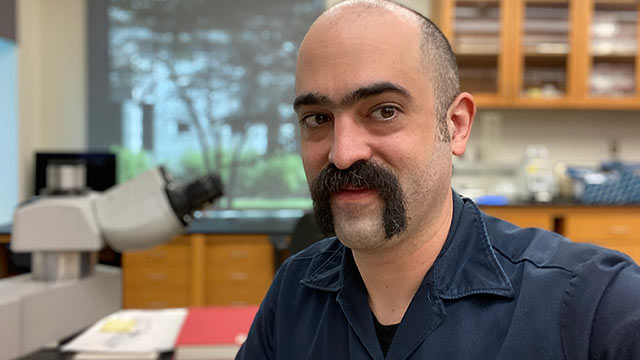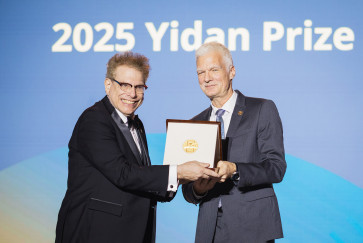The Pew Charitable Trusts have named Northwestern University molecular biologist Shelby Blythe a 2020 Pew Scholar in the Biomedical Sciences.
As a Pew Scholar, Blythe will invest the funding into studying how the genome “wakes up” at the very beginning of embryonic development. By exploring this process, he aims to better understand how the embryo manages to produce an entire organism from a single cell: the fertilized egg.
Blythe, an assistant professor of molecular biosciences in Northwestern’s Weinberg College of Arts and Sciences, is one of just 22 Pew Scholars named nationwide this year. After initially hearing about the award in March, Blythe said the news could not have arrived at a better time.
“Receiving this award was a rare piece of good news in the past few months,” he said. “I heard about the award back in March as I was literally locking the door to my lab and preparing for indefinite hiatus. It has motivated me to keep focused on pushing my research program further — despite daily reminders of global epidemiological, social and political turmoil.”
Pew Scholars are selected for outstanding promise in science relevant to the advancement in human health. Each receives $300,000 over four years to pursue research without restriction. The competitive program enables early-career scientists in medicine or the biomedical sciences to take calculated risks, expand their research and explore unanticipated leads.
“Support from Pew at this stage in my career is really encouraging,” Blythe said. “It will allow me to take on riskier projects and be more creative in the way that I approach challenges in my research. Some of my science heroes also were Pew Scholars, so it is a huge honor to be invited to join their ranks.”
Blythe also plans to use the funding to create a more inclusive environment in his lab and increase opportunities for other young researchers.
Receiving this award was a rare piece of good news in the past few months. I heard about the award back in March as I was literally locking the door to my lab and preparing for indefinite hiatus.”
molecular biologist
“One way to look at this award is that Pew is making a significant investment in the future of biomedical research by supporting a small group of promising young investigators,” he said. “I take that responsibility seriously, and I plan to work with Pew and Northwestern to find meaningful ways to use this opportunity to increase inclusion and diversity in the biomedical sciences because that’s the future I want to see. I hope that at some point soon, both our departments and the recipients of these distinguished awards more closely reflect the diverse backgrounds that make up our country. We hope to lead by example.”
In Blythe’s research, he works to understand the mechanisms that underlie how embryos make specialized cell types during the course of development. He also is interested in how embryonic cells, which are initially plastic in nature, shed that plasticity. In other words, once cells become muscle, they stay that way instead of turning into another type of cell, such as bone, for example. To study this, Blythe’s team uses cutting-edge time-lapse imaging and genomic sequencing to make “movies” of how the molecular organization of a cell’s nucleus changes when embryos activate and make different types of cells.
“The plasticity of cells — eggs becoming embryos, embryos making neurons and muscles and blood — is one of the most fascinating things about biology,” Blythe said. “In the long run, we aim to apply what we learn from the embryo to improve approaches for mimicking this process for cells in a dish to enhance applications in regenerative and stem cell biology. This award allows us to try some of our more ‘out-there’ ideas that would have otherwise taken a backseat.”


